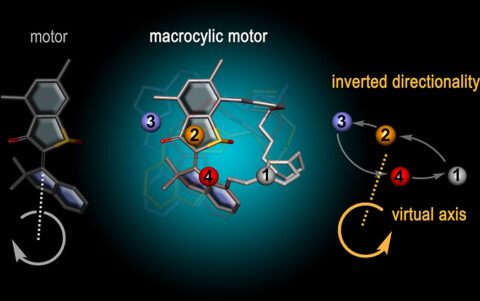Reprogramming Molecular Motors Enables Precise Control through Light and Solvent
Controlled movements at the nanoscale are fundamental to a variety of biological processes, such as ATP synthesis – the universal energy carrier in our cells or cell deformations necessary for muscle contraction. All these processes are made possible by biological molecular machines that convert chemical energy into controlled movements, ultimately performing work on the smallest scale.
To mimic these complex functionalities using synthetic nanomachines, it is crucial to gain control over molecular movements, particularly their directionality. Molecular motors are tiny driving units that play a central role in such nanotechnology. Molecular motors based on hemithioindigo are of particular interest since they can be powered by visible light – a green, easy to dose, and non-invasive energy source, giving them a significant advantage for future applications. Typically, molecular motors operate through unidirectional rotation around specific chemical bonds, with the direction of rotation dictated by steric effects.
The group of Prof. Dr. Henry Dube, Chair of Organic Chemisty I, recently developed an innovative method to control both the direction of rotation and the overall functionality of a hemithioindigo motor in a novel way. By reprogramming a classical light-driven molecular motor, they achieved unidirectional rotation around a virtual axis in opposite direction. This was accomplished by restricting the motor through incorporation into a macrocyclic setup, which reversed its original direction of rotation and transformed it into a directed motion of a larger molecular chain.
Another remarkable aspect of this work is that the function of this new molecular machine can be toggled between a directional motor and a non-directional photoswitch by simple changes in solvent polarity. This new control mechanism, responsive to environmental conditions, opens up an entirely new level of control and adaptability for future nanotechnologies.
This research marks a significant step forward in the development of intelligent nanomachines capable of precisely adapting their movements and functions to their surroundings. The findings could enable far-reaching applications in medicine, materials science, and nanotechnology.
Publication:
Directionality Reversal and Shift of Rotational Axis in a Hemithioindigo Macrocyclic Molecular Motor, Lilli Reißenweber, Edgar Uhl, Frank Hampel, Peter Mayer, and Henry Dube*, J. Am. Chem. Soc. 2024, 146, 23387 – 23397, https://pubs.acs.org/doi/full/10.1021/jacs.4c06377.
Further information:
Prof. Dr. Henry Dube
Department of Chemistry and Pharmacy
Chair of Organic Chemistry I
- Phone number: +49 9131 85-65571
- Email: henry.dube@fau.de

